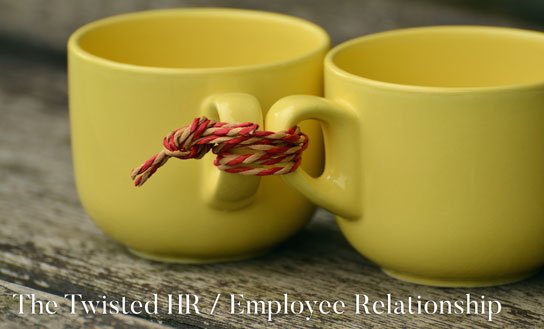
“My premise is this: the HR/Employee relationship is dysfunctional and almost surely codependent.”
– Paul Hebert
I am not a psychologist or psychiatrist, but I have stayed at many Holiday Inns in my time. That, and a bit of my own historical references allow me to have the following opinion. My premise is this: the HR/Employee relationship is dysfunctional and almost surely codependent.
Codependency is defined by a faux “helping” relationship where one person supports or enables another person’s addiction, poor mental health, immaturity, irresponsibility, or under-achievement. Among the core characteristics of codependency, the most common theme is an excessive reliance on other people for approval and a sense of identity. I don’t know about you all but that is almost a dead-on description of most HR/Employee relationships. And I’ll submit, most of the work being done today to help HR is actually creating a new, and more insidious codependent relationship.
I think our increasing dependence on technology (and AI in particular) is increasing the dysfunction between the HR staff, the employee and the technology.
Let’s dig into the why I think this.
Some Elements of Codependency
- HR feels like their job is to solve the problems of employees and managers. Either through training or technology versus enabling people to solve their own issues. How often does HR intervene to take over the role of the manager? Too often.
- If advice isn’t followed HR feels like they’ve been spurned and ignored. How dare they!
- Employees feel like everything bad that happens is someone else’s fault – HR’s, Management’s, the clients, the market. It’s never the employee’s fault is it?
- Connected with the thought of being faultless is the need to blame others and have excuses. I don’t think we need to dig much deeper than this.
- Whether we’re talking HR or employee – everyone in the company worries about being rejected or feeling unloved. In other words, too much of their value is tied up what others think vs. what they know is good work.
- Codependent people don’t think for themselves but rely on others for direction. Can we say lack of self-management? Lack of autonomy? Of all the reasons we have engagement and employee issues this is probably #1 on the hit parade.
- The relationship is conditional – “If this, then that.” Not sure how we get around this one, but it is a classic foundational codependent element.
- The need to control the outcome. Again – this is either HR or employee focused. Too often today we NEED control because we are concerned that ceding control makes us vulnerable to being laid off or reprimanded. Our lack of trust creates this need.
- Saying Yes when they really should say no. I’ll just leave this here because I know that saying no is a kiss of death in today’s world. Aren’t we all team players? Yes is the only answer for a team right?
- You can’t communicate. Has anyone had a great conversation with HR? Does HR ever really think they get through to employees? Doubtful.
I stopped at 10 because frankly this could go on forever and I think these few examples pretty much sums up my point.

Paul Hebert | Founding Member, HRExaminer Editorial Advisory Board
So how do we fix this?
- Be Honest – admit we have this relationship. Stop believing we have a “professional” relationship when all relationships are emotional, personal, human. Regardless of where the relationship happens the elements that drive that relationship follow human paths. Admit we have the problem and we can start to fix the issue.
- Accept our differences. Know we are human and that we have to make allowances for that. Don’t try to create such rigid processes that they don’t fit the human condition. Once we create static processes is when the individual starts to feel disconnected, less valuable, less autonomous. All the things that begin to create a codependent relationships.
- Know what you’re actually responsible for (both HR and employees). “The employee is unhappy today, but their happiness isn’t my responsibility. I do not have to feel bad/anxious if they are not happy.”
- Make people responsible. Don’t rely on technology to do your work. Use technology to identify what work YOU need to do. Big, big difference.
- Know the difference between co-dependence and interdependence. Business is a function of interdependence and requires two people doing what they do best, taking responsibility for their own work, attitude and actions. Codependent people focus on how the “other” person can be responsible for their success.
- Finally, create specific and enforceable job functions/outlines. Codependency is primarily about boundaries. Create them and stick to them.
I know this is a bit of a stretch and there isn’t really hard evidence that I’m right (but I am.) But ask yourself how much more productive you and your company would be if every day, everyone in the organization got up, and looked in the mirror and said…
“I’m good enough, I’m smart enough, and gosh darn it, people like me.











